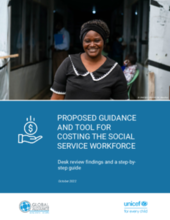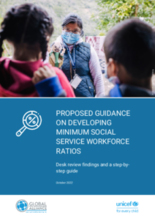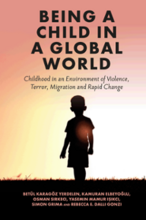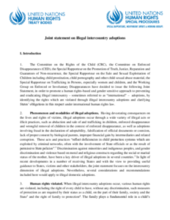Displaying 661 - 670 of 4424
The purpose of this guidance is to advise policy makers and planners on how to apply a set of variables to their specific context to enable them to calculate the costs of human resources required to meet a target minimum ratio of social service workers per population, in the country in question. The guidance first discusses the essential steps that need to be taken to prepare for a costing exercise, and then the specific steps to take in a costing exercise for the workforce, which are outlined in the costing tool itself (to be released at a later date).
This guide is intended to inform policy makers and workforce managers in ministries of social welfare, finance and planning, and, where applicable, provincial or district authorities and other relevant national bodies responsible for the recruitment, deployment, funding or regulation of the social service workforce. The guide can also be used by a national level leadership group tasked with defining an adequate level of resourcing for social services, and, on this basis, a minimum ratio of workforce to population, alongside other steps to strengthen the social service workforce.
The Special Representative of the Secretary General on Violence Against Children will present for the first time ever her General Assembly Report to Children.
UNCEF's newest Goodwill Ambassador, 25-year-old Ugandan activist Vanessa Nakate, has been calling for urgent action to mitigate climate change since 2019, when she organized a protest with her siblings and cousins on the streets of Kampala. Inspired by Greta Thunberg, Nakate continued to protest weekly, becoming a well-known face in the movement of young people striking for climate action around the world.
This study aims to provide an overview of the world's children who lack parental care in the light of the theoretical background and the latest research.
The Adolescent Data Portal features global, regional and country-level data on key indicators together with information on the socio-economic contexts in which adolescents live are found here. The portal includes globally comparable indicators, closely linked to the Sustainable Development Goals (SDGs).
Institutionalised Children: Explorations and Beyond Journal encourages experts in care of children in institutional and alternative care to review the research in the journal and provide experienced insights to submitted papers. The editorial staff highly value the contribution of peer reviewers of the journal as the essential gatekeepers of its standards. Some perks for your review include free access to all SAGE journals for 60 days upon receipt of your completed review and a 25% book discount on all SAGE books ordered online.
Illegal intercountry adoptions may violate the prohibition of abduction, sale of or trafficking in children and the prohibition of enforced disappearances, a group of UN rights experts said today, urging States to take action to prevent and eradicate such illicit practices.
This joint statement was issued while the question of illegal intercountry adoptions is being raised in several countries, with an increasing number of adoptees discovering inconsistencies or errors in their adoption process, and that stories they had been told about their origins and the reasons for their adoptions were fake.
Family for Every Child invites you to participate, share your views and listen to children and young people on this topic. Join this event and be part of a global call to action to protect children from family violence.




